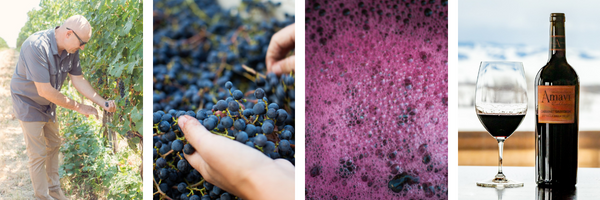What does 100% Estate Mean?
August 11, 2022
Amavi Cellars prides itself on producing estate grown wines that showcase the distinct personality of the Walla Walla Valley. Our estate vineyards include Seven Hills, Pepper Bridge, Les Collines, Octave, Goff, Stone Valley, and Summit View, which produce some of the most sought-after grapes in the state.
But what does estate mean?
Overall, estate means that Amavi Cellars controls 100% of the farming and growing of our grapes and the wine is made from start to finish on-site and all from the Walla Walla Valley AVA. By including 100% Estate on our labels, we’re telling the wine’s origin story and emphasizing the additional care and attention that are put into each bottle.
You may be wondering how this distinction impacts the final product — by controlling the process from vine to glass, we ensure consistency and the very best quality.
Separate from the complex process of winemaking, wine growing entails monitoring and controlling pests, determining when to fertilize and water, overseeing fruit development and characteristics, and deciding when to prune and when to harvest. Our Director of Winemaking, Jean-François Pellet, who is a third-generation wine grower and holds degrees in both Enology and Viticulture, has paid careful attention to every step of the wine’s life, from growth to fermentation, to bottling, and beyond.
If you’re like us, you want to know how your food is grown and where it is produced. The same can be said for wine lovers. In addition to the usual components on a wine label such as country and region, producer, grape varietal, vintage, et cetera, a bottle bearing the word estate indicates exceptional quality and consideration. The person who grew the grapes also made the wines, bringing their own expertise and uniqueness to their product.


